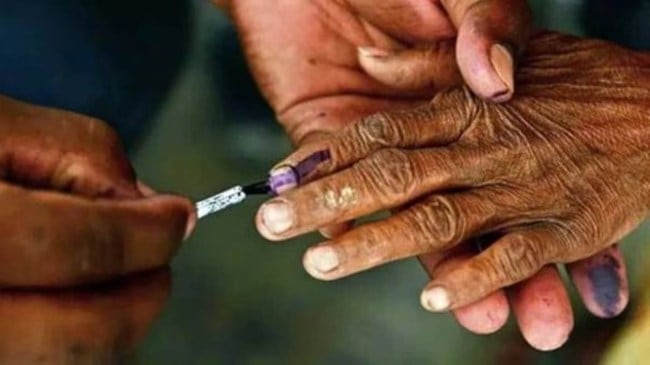Opinion The southern bulwark
The five south Indian states could create a regional bank to help boost investments in the region
 The Centre is referring to the ONOE as a milestone reform, which would arguably address the fragmented, and frequent occurrence of elections in India. (File Photo)
The Centre is referring to the ONOE as a milestone reform, which would arguably address the fragmented, and frequent occurrence of elections in India. (File Photo) Written by Anvesh Reddy P
A thread of injustice underlies the controversial idea of “One Nation One Election” (ONOE). It is the continuation of a deep bias against India’s southern region, that is, the five states of Telangana, Tamil Nadu, Andhra Pradesh, Karnataka and Kerala, and the Union territory of Puducherry. While the ONOE will only seed the basis of long-term political disempowerment, in conjunction with the impending delimitation exercise, it will deliver a terrible blow to the South.
The Centre is referring to the ONOE as a milestone reform, which would arguably address the fragmented, and frequent occurrence of elections in India. However, it disregards the subsequent fragmentation the southern region could suffer from the rest of the Indian federal system. It could also be rendered politically weaker in contradistinction to the northern states.
Delimitation based on population is a process that is skewed against the southern states. India, that is Bharat, is a union of states; and such a union argues for equity between states. Yet, post-2026, the union stares at a delimitation exercise that would most certainly be unfair to states that have efficiently implemented family planning measures over the last several decades and almost reward those who have not. The south will have a lower share of political representation if delimitation is based only on the basis of population.
One of the strongest voices against the unfairness of the delimitation exercise has been Chief Minister of Telangana, A Revanth Reddy. He rightly argued that by bringing in a population-based delimitation exercise, the Centre was trying to reward states in a way that would benefit the vested political interests of the party at the Centre.
“If the Southern region doesn’t get its fair share, we shall oppose it,” he has said. His counterparts in the other southern states have echoed similar concerns. Chief Minister of Andhra Pradesh, N Chandrababu Naidu, urged all South Indians to consider having more children. Chief Minister of Tamil Nadu M K Stalin went a step ahead and asked why people in his state should not have 16 children, as a move to preserve Lok Sabha seats.
What will India gain out of simultaneous elections? A high-level committee chaired by former president Ram Nath Kovind concluded in its report that implementing ONOE could lead to an increase in GDP by up to 1.5 per cent. Apparently, economic interests are at the core.
In accordance with the provisions of the Delimitation Act, orders of India’s Delimitation Commission have the force of law and cannot be called into question before any court. Hence, it comes down to the political discretion of the powers that be who are choosing to orphan southern states — leaving them powerless politically, with economic prowess as the only means to protect themselves.
Irrespective of the outcome of the delimitation exercise, it is time for the governments of all five southern states to come together and prioritise their interests — especially economic interests — above their respective political interests. How can this be done? This remains a million-dollar question.
South India’s regional industrial bank
For starters, these five states could set up a strategic bank to enable preferential access between member states, with emphasis on loaning, financing and incentivising firms investing in these states. Such banks exist at a continental level, like the Asian Development Bank, but seldom for a region of a country.
As per a recent working paper from the Economic Advisory Council to the Prime Minister, Relative Economic Performance of Indian States, the southern region collectively accounted for nearly 30 per cent of India’s GDP in 2023-24.
As good as having another Mumbai
In terms of bank deposits and credit, the southern region stands nearly equivalent to the western region, which is largely dominated by the economic powerhouse in Maharashtra (Mumbai) and a fast-growing Gujarat. There is a clear pattern to this.
State-wise bank data between 2019 and 2024 indicates that southern states are perpetually a notch behind the western states. One way to look at this is: The southern region’s financial muscle is giving Gujarat and Maharashtra a run for their money each year.
Clearly, banks in the southern region grew faster in creating credit assets in the last five years. This is a strategic advantage and one that needs to be protected, consolidated and built upon further.
The NDA-ruled states secured almost all semiconductor manufacturing investments in the last few years. This is where a consortium of state governments in the south could come into the picture: To create a regional, more productive and local-centric bank on the lines of the Asian Development Bank (ADB). Such a bank could help play the balancing act, in stabilising cash flows and in turn create a ripple effect advantage among regional industries.
On a wider scale, state governments will have a say in the decision-making process with regards to policies and together, hold an edge in extending incentives to businesses looking towards the south.
Reddy P is a public relations officer in the Government of Telangana


